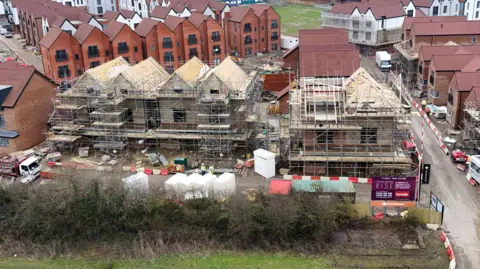Environmental rules reviewed for small housebuilders

 PA
PAEnvironmental rules that force developers in England to improve wildlife habitats could be eased under government plans to make it easier to build homes on smaller sites.
The government is reviewing Biodiversity Net Gain (BNG) requirements, under which builders must compensate for the loss of any nature on housing developments.
Ministers say they are are considering how costs can be reduced for smaller housebuilders whilst also delivering habitats for wildlife.
The proposals are part of a package of housing reforms to be set out by the Labour government on Wednesday.
Housing Secretary and Deputy Prime Minister Angela Rayner wants to simplify the planning system to speed up house-building on smaller sites.
There are plans to ease BNG requirements for minor developments of up to nine homes and give trained planning officers rather than councillors the power to approve them.
Ministers have also suggested exempting sites of between 10 and 49 homes from a tax to fund the removal of unsafe cladding.
The government said smaller firms had seen their market share shrink since the 1980s, when small- and medium-sized builders delivered 40% of the country’s homes.
“For decades the status quo has failed them and it’s time to level the playing field,” Rayner said.
“Today we’re taking urgent action to make the system simpler, fairer and more cost effective, so smaller housebuilders can play a crucial role in our journey to get Britain building.”
The Conservatives said they had been pushing the government to do more to support small businesses.
Shadow secretary for local government, Kevin Hollinrake, said Labour was “stripping councillors of the right to vote on local planning applications, concreting over green belt and withdrawing support for first-time buyers”.
He said Rayner would bring “higher taxes and less say over development in your community”.
Ministers hope these policy changes will help them reach the government’s stated aim of building 1.5m new homes in England by 2030.
Office for Budget Responsibility (OBR) figures released in March suggested housebuilding would fall short of the 1.5 million target, even with planning reforms previously outlined earlier this year.
The government argued that further reforms not factored into the OBR forecast would help it reach the number.
Last year saw a record low for housing projects granted planning permission in England, with just over 30,000 projects given the go-ahead.
The difficulty of hitting the house-building target has brought the impact of BNG into sharper focus.
BNG became a mandatory part of the planning system in England in February as part of the 2021 Environment Act.
It means sites have to be assessed and housing developers must commit to delivering a 10% net improvement in biodiversity that lasts over a 30-year period.
Last month, the Home Builders Federation said the BNG had placed a “disproportionate burden on small and medium-sized home builders”.
“The home-building industry has embraced BNG and is committed to both increasing housing supply and protecting and enhancing our natural environment,” Neil Jefferson, chief executive at the Home Builders Federation, said.
“However, if we are to increase supply alongside these new requirements it is vital to address emerging barriers to implementation, such as the insufficient resourcing of local authorities, shortage of ecologists, and inadequate national guidance.”
But the Wildlife and Countryside Link, a coalition of conservation groups, urged the government not to “turn back the clock to the days of damaging development”.
Richard Benwell, chief executive of Wildlife and Countryside Link, said: “Exempting small sites would mean almost three-quarters of developments face no requirement to compensate for nature loss – let alone enhance it.
“These changes could leave the Biodiversity Net Gain system dead in the water and, with it, the government’s main guarantee of nature-positive planning.”
The government is launching a consultation reviewing BNG and alongside this, is investing £100m in loans to help smaller house-building firms.
Source link






